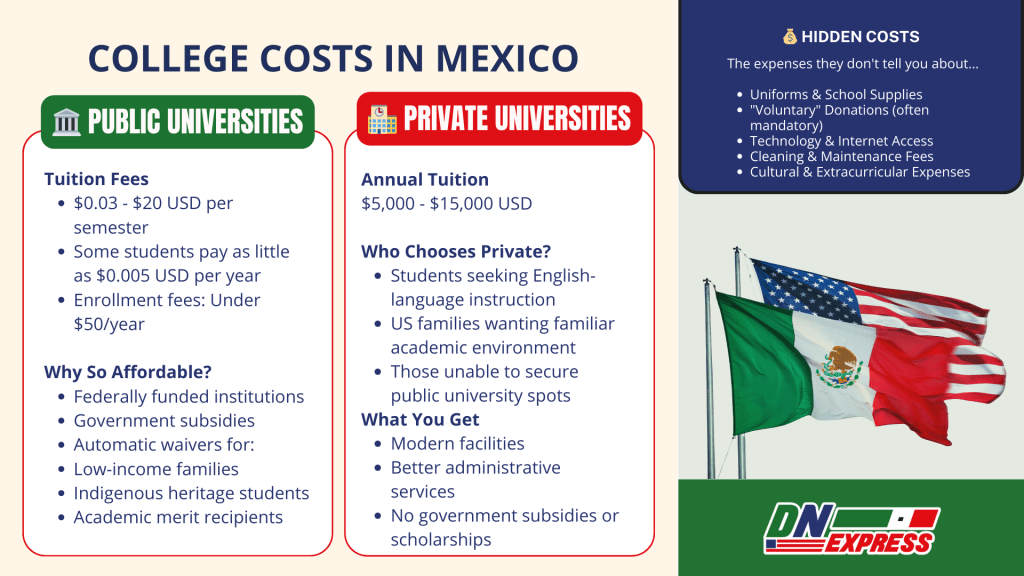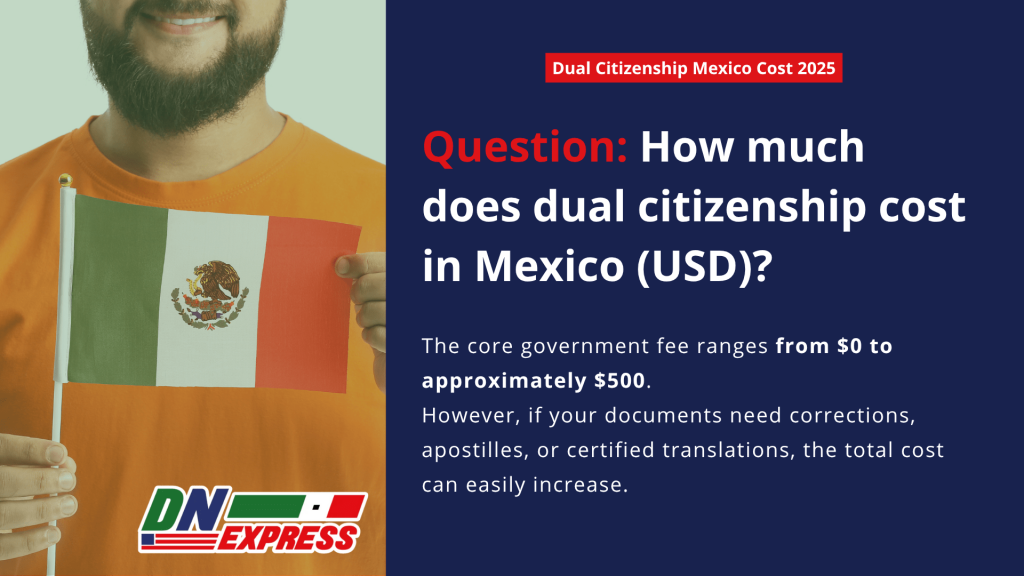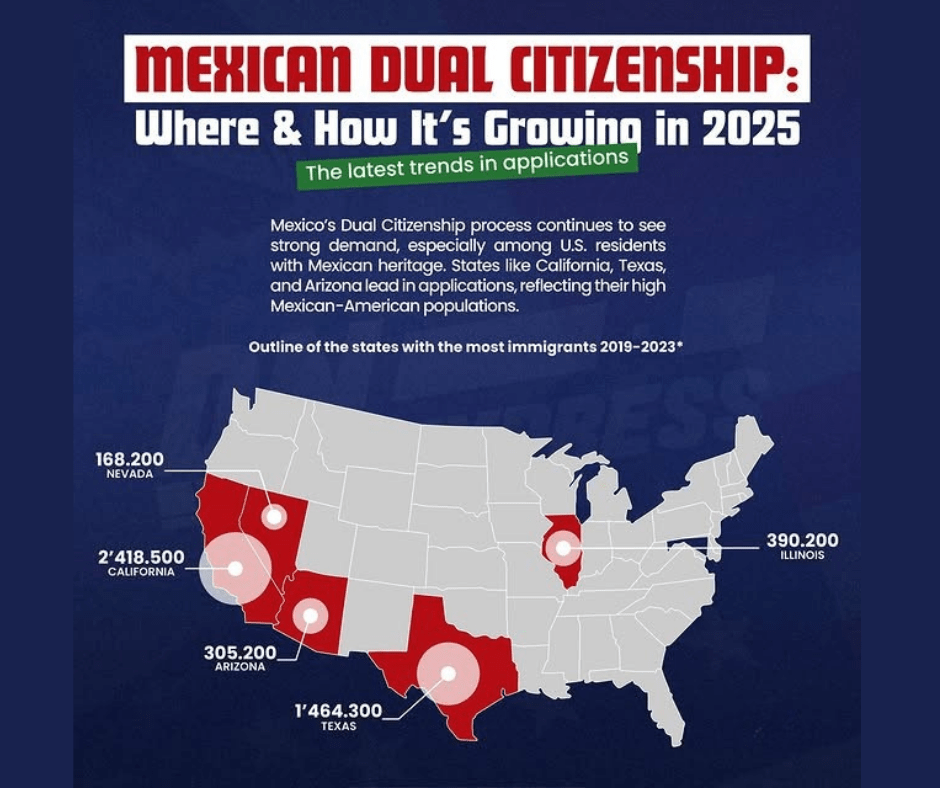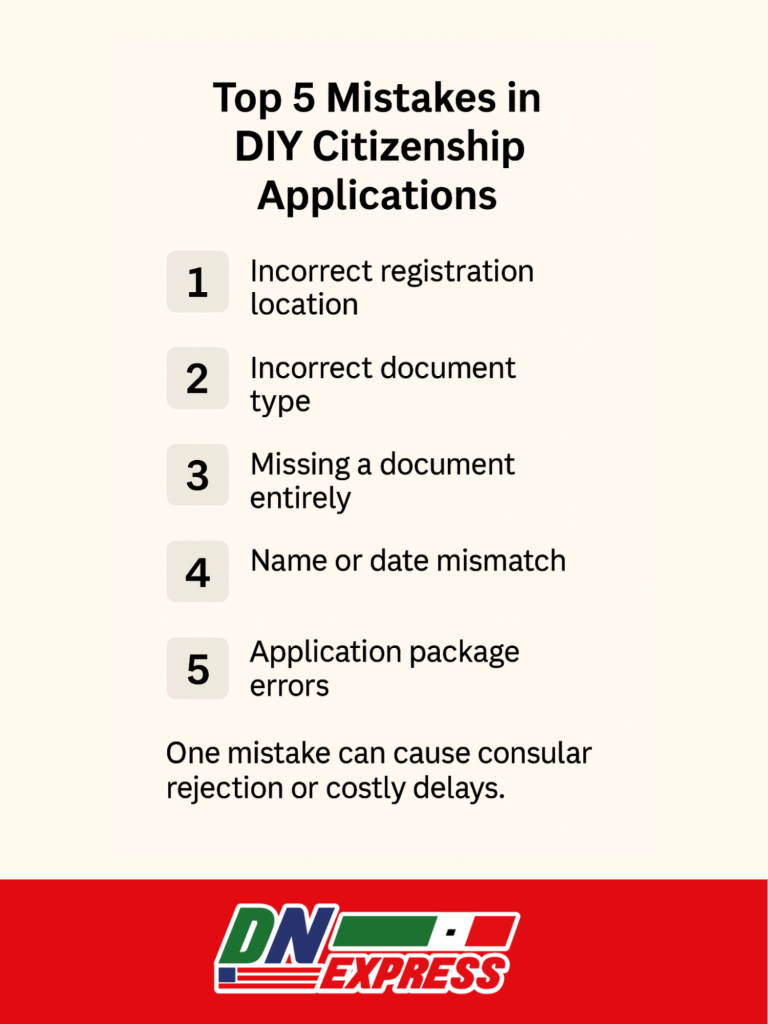
Yes, college can be nearly free in Mexico at public universities like UNAM or IPN, with tuition costing as little as $0.03 per semester.
Scholarships are widely available, but your costs and access can depend on citizenship, location, and legal status.
If you're a U.S. citizen, dual national, or parent exploring options for your children, here's what you need to know:
- Public universities charge symbolic fees, often less than $1 per semester.
- Foreigners pay higher rates, unless they obtain Mexican citizenship or legal residency.
- Living costs vary, but many families spend under $500/month, including housing, food, and transport.
- Dual nationals save thousands, and many families pursue citizenship specifically for the education benefit.
As the founder of Doble Nacionalidad Express, I've seen hundreds of families unlock life-changing opportunities in Mexico, especially when U.S. college is out of reach.
We make the legal side simple so you can focus on what matters: your family's future.
If you're here for the quick facts, you've got them.
If you want the full breakdown, how much college costs, how to qualify, and how citizenship can change everything, keep reading.
How Much Does College in Mexico Actually Cost?

Public Universities (UNAM, IPN, UAM)
Yes, college in Mexico really can be that affordable.
At top public universities like UNAM, IPN, and UAM, tuition is largely symbolic, ranging from $0.03 to $20 USD per semester, depending on the program and institution.
These institutions are federally funded and intentionally designed to be accessible to all socioeconomic classes.
In fact, some students report paying as little as $0.005 USD per year in tuition, thanks to government subsidies and automatic waivers for low-income families.
Enrollment fees, similar to registration or maintenance costs, typically fall under $50/year.
Even those may be reduced or waived depending on your status such as Indigenous heritage, economic hardship, or academic merit.
But don't be fooled by the tuition number alone.
Hidden Costs
While the sticker price of tuition is astonishingly low, families are often surprised by the indirect costs that come with attending even a “free” public university in Mexico:
- Uniforms and school supplies. Many schools expect students to purchase standardized clothing, calculators, lab materials, and notebooks.
- Enrollment “donations.” These are often labeled as voluntary but functionally mandatory, especially when tied to document release or class placement.
- Technology and internet access. Hybrid and online classes require stable Wi-Fi, which is not guaranteed on all campuses.
- Cleaning and maintenance fees. Students are sometimes expected to contribute to janitorial services or even bring hygiene supplies to class.
- Cultural and extracurricular expenses. Participation in events, performances, or festivals often comes with costume, food, or travel costs.
For families already living on tight budgets, these costs can amount to 50% or higher of their monthly income, even if tuition is “free.”
Private Universities
If you're considering a private university in Mexico, expect a very different financial landscape.
Annual tuition ranges from $5,000 to $15,000 USD, depending on the program, prestige, and city.
These schools often appeal to:
- Students looking for English-language instruction
- U.S.-based families seeking a familiar academic environment
- Those who couldn't secure a spot in a public institution due to limited capacity
While they offer modern facilities and often better administrative service, they don't come with the same tuition subsidies or scholarship access available to Mexican nationals at public universities.
Can U.S. Citizens Go to College in Mexico?
Yes, But There Are Key Distinctions
Absolutely, U.S. citizens can attend college in Mexico, but your experience will vary drastically depending on your legal status.
If you're applying as a foreigner, you'll need to:
- Pay international student tuition, which is significantly higher than citizen rates
- Obtain a student visa, which includes proof of acceptance, financial solvency, and sometimes police records
- Navigate a bureaucratic system, which can be slow, inconsistent, and poorly digitized
By contrast, U.S.-born students with Mexican parents who claim their Mexican citizenship or dual nationality can access public universities at local rates.
This comes with all the scholarship, residency, and legal perks that come with it.
This is why many families come to Doble Nacionalidad Express.
A parent may assume their child doesn't qualify, or they may have been turned away by a consulate.
In most cases, we can help them secure Mexican citizenship from the U.S., without ever stepping foot in Mexico, and open the door to virtually free college tuition.
Frequent Worries We Hear
We've worked with hundreds of families, and these questions come up over and over:
- “Will I be rejected for being a foreigner?”
- If you're applying as a foreigner, your chances depend on capacity and funding.But dual nationals are treated like citizens and have far greater access to public university spots.
- “What if my Spanish is not fluent enough?”
- Most public universities teach in Spanish. Some offer English-language tracks, but language proficiency is necessary, especially for entrance exams.
- “Is it safe to send my kids across the border?”
- Safety varies by region, but many families choose to send their children to live with relatives, attend commuter-friendly campuses, or study in border towns near the U.S. for convenience.
- “Can I trust the quality of a Mexican education?”
- Top public universities like UNAM, IPN, and UAM are nationally ranked and respected throughout Latin America. Their graduates include Nobel laureates, doctors, engineers, and political leaders.
- “Will my degree be valid back in the U.S.?”
- Many degrees are recognized, especially in engineering, healthcare, and social sciences. However, some programs, like law or education, may not transfer cleanly without additional certification.

Is It a Good Idea to Study in Mexico?
Pros
- For many U.S.-based families, especially those with Mexican roots, studying in Mexico offers a powerful combination of affordability, access, and cultural value.
- Nearly Free Tuition: At top-tier universities like UNAM or IPN, tuition is almost symbolic, sometimes less than $1 USD per semester.
- Affordable Living Costs: Many students live comfortably on $300 to $500/month, especially if they stay with family or in less expensive states.
- Cultural and Language Immersion: Students gain fluency in Spanish and deeper connections to Mexican heritage, something many U.S.-born children of immigrants deeply value.
- Full Healthcare Access: For those who claim Mexican citizenship, public healthcare is available at no extra cost, covering basic medical needs during their time in school.
We've seen many families choose Mexico not only because it's cheaper, but because it offers a sense of belonging and pride.
A chance to reclaim both education and identity.
Cons
That said, studying in Mexico is not for everyone.
There are trade-offs, and it's good to know them upfront.
- Bureaucratic Admissions Process: From entrance exams to registration to housing, delays and lack of clear communication are standard, even for locals.
- Instruction is in Spanish: While this is a benefit for heritage learners, it can be a challenge if your Spanish is limited or if you're not comfortable learning technical subjects in a second language.
- Degree Transferability: Not all degrees are recognized in the U.S. without additional validation.This is especially true for careers like law, education, and sometimes healthcare.
- Limited Dorm Housing: Most public universities do not offer dormitories.
- Students must find off-campus housing or live with relatives, which can pose logistical challenges.
What About Admission and Scholarships?
Entrance Exams & Competition
Getting into a Mexican public university, especially the top ones like UNAM or IPN, is no cakewalk.
Admission is based primarily on national-level entrance exams, which are highly competitive and administered entirely in Spanish.
These tests vary slightly by institution, but all require solid academic preparation. For example:
- UNAM's exam covers subjects like math, language, science, and logic
- IPN evaluates specific technical skills depending on the program
Because admission spots are limited and the schools are highly subsidized, the competition is fierce, even among Mexican citizens.
This can be intimidating for U.S.-born applicants, but here's what we've learned: Preparation and legal status matter most.
Students who claim their Mexican nationality, study ahead, and apply on time have as much of a shot, if not better, than those applying as foreigners.
Scholarships & Subsidies
Despite the low tuition, there are substantial scholarship programs aimed at helping students cover living expenses, travel, school supplies, and even laptops.
Indigenous, rural, or economically disadvantaged students are often prioritized in these programs.
Some institutions, particularly newer or regional ones, offer special English-language programs to attract international students or return migrants.
Single moms and working parents frequently seek Mexican citizenship for their children in order to access these subsidies, especially if U.S. aid is out of reach or denied due to immigration status.
We've helped countless families navigate these opportunities, many who had no idea they were eligible in the first place.
In fact, some of our clients were surprised to learn that their child's birthplace in the U.S. did not disqualify them.
They simply needed to reclaim their citizenship and submit the right paperwork.

How Does Mexican Citizenship Help?
Why Apply for Dual Citizenship First?
If you're serious about studying in Mexico or helping your child do so, Mexican citizenship changes everything.
With it, you or your child will:
- Be treated as a local student, with access to the lowest possible tuition rates at public universities
- Avoid foreign student restrictions, including higher fees, student visa applications, and limited course access
- Qualify for government scholarships, especially those tied to financial need or regional identity
- Receive full healthcare access through public institutions, no need to purchase separate insurance
- Gain residency rights, meaning no expiration dates, visa renewals, or legal hurdles to stay in the country long-term
In many of the cases we handle, families had been told they did not qualify, only to find out they absolutely did.
Whether your parent is Mexican, your spouse is, or you're reclaiming a long-lost connection, we've built a process that gets results.
Why Work with Doble Nacionalidad Express?
DNExpress Makes It Simple, Fast, and Legal
If you're exploring college in Mexico for yourself or your child, the biggest roadblock is often not the school, it's the paperwork.
We've built a service that removes those barriers entirely:
- You don't have to visit the consulate. We handle the full process remotely from within the U.S.
- Your case is managed by licensed Mexican attorneys, not third-party agents or online form fillers
- We specialize in difficult cases, missing records, name mismatches, or previously rejected applications, and get them resolved legally and fast
Our mission is rooted in fairness and accessibility.
This system should not favor those with time, lawyers, or connections.
It should work for every family trying to give their children a better future.
What Happens If You Do It Alone?
We've seen too many families delay their child's education because they were misinformed, misadvised, or misled.
A single typo or document error can lead to rejection or years of delay.
Consulate waitlists stretch for months, and appointments are routinely canceled or rescheduled without notice.
If your paperwork is not corrected before applying for college, you may pay foreigner tuition, even if you're technically eligible for citizen rates.
Doing it yourself might save money upfront, but it often costs far beyond that in the long run, in time, opportunity, and tuition fees.
For families needing document translation services, proper certification is necessary for all citizenship applications.

DNExpress Is for Families Who Want to:
- Get their kids into college without debt, and without the stress of student loans
- Reclaim their legal and cultural identity, and pass it on to the next generation
- Secure long-term benefits like healthcare, property ownership, and easier cross-border mobility
We believe every family deserves to know their options and reclaim what's rightfully theirs.
If you're ready to take that step, we're here to walk it with you.
Ready to Reclaim Your Rights?
If you're reading this, chances are you or someone you love has roots in Mexico, and you're looking for a better, affordable path to higher education.
Whether you're a parent trying to secure a debt-free future for your child, or a student exploring your options outside the U.S. system, Mexican citizenship can unlock the doors to opportunity, affordability, and belonging.
We make that process simple, legal, and life-changing.
✅ Schedule a Free Case Review
📞 Call or Message Us on WhatsApp
🌎 We Serve Clients in All 50 States, No Travel Required
View our transparent pricing and service options.
You don't have to navigate this alone.
We've helped thousands of families across the U.S. reclaim their rights, without stepping foot in a consulate.
Let us do the same for you.

FAQ
Is a Mexican college degree valid in the U.S.?
In many fields, yes, especially engineering, social sciences, and business. However, degrees in law, education, and healthcare may require additional certification to be recognized in the U.S.
How hard is it to transfer from a U.S. university to Mexico?
It's possible, but not always straightforward. Credit transfers depend on institutional agreements, and you may still need to take entrance exams or restart your program from an earlier point.
Can I apply to multiple universities at once?
Yes, but each university has its own application timeline and process. Unlike the U.S. system, applications must be submitted individually.
Are there age limits for scholarships?
Some programs are age-sensitive, especially for youth-targeted subsidies. But there are also options for non-traditional students, parents, and returning adults, especially if they're Mexican citizens or residents.
What countries offer free college to everyone?
In addition to Mexico, countries like Germany, Norway, and Finland offer tuition-free education, but citizenship or residency often plays a key role in access and affordability.
Can I switch to citizen rates mid-program?
Yes. Once your Mexican citizenship is finalized, you can request a reclassification of your student status and immediately become eligible for local tuition and benefits.
Do I need to visit the consulate to apply for citizenship?
Not if you work with us. We handle everything remotely, no consulate appointments, no travel, and no waiting in lines. We specialize in getting Mexican citizenship from within the U.S., legally and efficiently.



